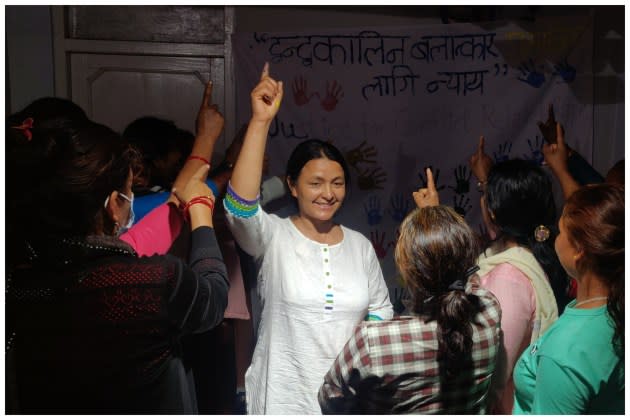Subina Shrestha’s ‘Devi’ Traces Nepalese Activist’s Path From Survivor of Sexual Violence to Seeker of Justice (EXCLUSIVE)

Filmmaker and journalist Subina Shrestha’s “Devi”—about Devi Khadka’s journey from surviving wartime rape to fighting alongside rebel guerrillas in Nepal’s civil war to working for justice in her country’s transitional justice movement—lands at Toronto’s Hot Docs as international awareness of and concern about the safety, rights, and health of women in conflict zones around the world intensifies.
Last month in the Hague, in opening remarks at the first International Conference of Prosecutors on Accountability for Conflict-Related Sexual Violence (also referred to as CRSV), U.N. special representative Pramila Patten noted that the Secretary-General’s annual report for 2023 shows an increase of 49% in the number of cases of CRSV from the previous year.
More from Variety
'The Strike' Review: Doc Chronicles a Battle to Halt Endless Solitary Confinement
Nat Geo Documentary 'Fly,' Exploring the World of Base Jumping, Unveils First Clip (EXCLUSIVE)
In an exclusive in-person interview with Variety in advance of her film’s world premiere on April 28, Shrestha said that Devi’s story is both unique and universal. (Devi was scheduled to attend the premiere but her visa was not ready in time.)
“Every country that has war has the same stories of sexual violence but they never get attention in reparations,” said Shrestha, noting that the U.N.’s Security Council Resolution 1820—which recognizes the use of sexual violence as a tool or tactic of war and stresses that such crimes should be excluded from amnesty provisions—was only adopted in 2008.
“In Nepal, nobody had raised this issue of sexual violence after the civil war ended,” she continued. “People who were wounded and families of the dead were compensated but people who experienced sexual violence were shunned.”
Early in the civil war, which erupted in 1996 between Maoist guerrillas and the monarchy government, Devi was accused of rebellion. She was tortured and raped by police while in custody. After her release in 1997, the Maoist leadership put Devi in front of the media.
“Devi’s story was the only one to come out and so it was impossible to talk to her after that because she had been vilified by the media and did not want to tell her story to media,” said Shrestha, who was a rookie journalist in Nepal doing stories on Maoist women when she first heard about Devi.
“As a woman and a storyteller, when you know that nobody else is going to tell that story, there’s nothing else you can do but to tell that story whatever way possible.”
Now based in the U.K., Shrestha reached out to Devi multiple times over the years without success, all the while building a career as a journalist in both print and broadcast, garnering recognition for her coverage of Nepal’s earthquake and reporting undercover in Myanmar.
This work, as well as her connection to former Maoist and independent Nepalese journalist Asmita Khadka (one of the doc’s producers and its researcher), landed her a meeting in 2019. “(Devi) gave me her diary, and said do whatever you need,” Shrestha said. “We had to interview her multiple times to understand it, and it was a long process to gain the trust of her family.”
Gentle scenes of Devi’s family life and her interactions with Nepalese women who experienced sexual violence during the war are interwoven with archive and interviews to convey her backstory as well as footage following her development as an activist. Consent was a constant priority during filming.
Devi became a parliamentary politician after the war ended in 2006. She did not plan to become an activist or public leader in justice for fellow survivors, but the filmmaking process changed her perspective, Shrestha said. “When she started telling her story there was no stopping her, and our responsibility as filmmakers changed. There were stops and starts, and the therapist who has helped (Devi) in 1997 came on board for our filming with Devi.”
In the early stages, the team couldn’t raise funds in Nepal, let alone talk about the project openly due to their concerns about certain people in power at that time. The film’s circle was initially tight, composed of Shrestha, Khadka and London-based producer Rosie Garthwaite. In addition to shooting, cinematographer Bishnu Kalpit, who worked with Shrestha on stories for Al Jazeera over many years, also contributed and sourced never-before-seen archival footage of Nepal’s civil war.
They drew on personal resources for funding to keep things rolling. Shrestha was also a recipient of a 2022 Ochberg Fellowship from the Dart Center for Journalism and Trauma at Columbia University’s Graduate School of Journalism, which supports mid-career journalists seeking to improve their reporting of traumatic events and their aftermath.
Further into the process, Danielle Turkov and Amy Shepherd of Think-Film Impact Productions helped connect Devi to international conversations, organizations, and actions around CRSV. They are credited as executive producers, alongside Danish producer Sigrid Dyekjær (“The Cave”).
Producer Heejung Oh, who works between Seoul and Amsterdam, approached the team after a pitch event with an offer to get involved. Phil Jandaly and Nicole Hálová edited the film.
On Hot Docs’ opening weekend, the producers announced that Esther van Messel of Zürich-based First Hand Films is handling sales for “Devi.” With the exception of South Korea, all world rights including broadcast are available.
“The filmmaking was helping Devi build her strategy while working through the impact side of it,” Shrestha said. “Now she’s doing her own thing. When we started the film, there was nothing in Nepal’s transitional justice process for sexual violence. Now there is an amended bill and all the demands she asked for are included.”
“Devi” screens again on May 1 at Hot Docs.
Best of Variety
Sign up for Variety’s Newsletter. For the latest news, follow us on Facebook, Twitter, and Instagram.
